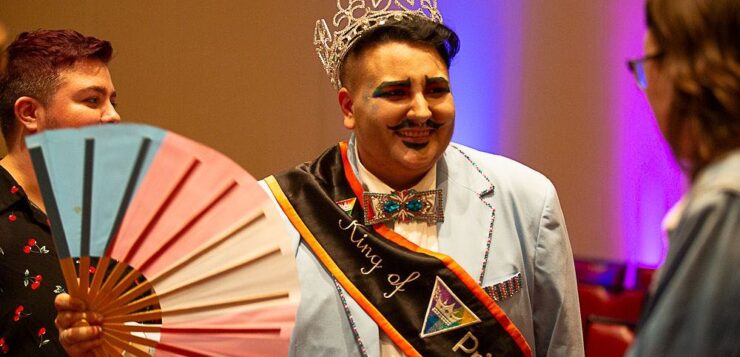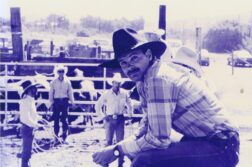
It was dark around the stage lights, and a drag king named Mars was lip synching to “Could Have Been Me,” by The Struts. The 2023 St. Louis Pride Pageant was underway, and after a yearlong reign, Mars was preparing to step down as King of Pride.
Like the queens at the event, Mars was dripping in rhinestones. His body language was grandiose as he gestured to himself and the audience, composed of 350 people waiting to see the crowning of the new court.
His shirt, black lace, was tucked into his pants, and halfway through the song it started to unbutton. It wasn’t long before Mars yanked the shirt open to reveal his entire torso.
I had seen Mars’ body before. It was not the first time I thought: How did he, or anyone assigned female at birth, manage to exude this level of comfort in their own skin? The scars under his nipples from his top surgery glistened under the stage lights. He made no effort to shrink his body, something I was taught since I was a girl.
I didn’t get to watch Mars entire performance at the Pride Pageant because I was competing for a title of my own: Mx Pride St. Louis. I wouldn’t have entered if it wasn’t for Mars. We first met at Prism, a gay bar in a central neighborhood in St. Louis. He was the bartender, and I came in every Sunday night to participate in Rising Stars, the open stage up-and-comers drag show.
The first night I met Mars, we struck up a conversation as though we had been friends for decades. There was something familiar about him: his charisma and smile. I learned that he also did drag, and he handed me his phone to scroll through pictures from the night he was crowned King of Pride.
As I scanned the images, Mars told me about his evening wear suit, how he applied all the rhinestones himself. He told me about his glittery mechanic’s costume (which reminded me of my first drag king performance, inspired by my father, who fixed cars for a living). He also told me about his creative take on a Pride-themed look, for which he wore scrubs and a surgeon’s hat to honor healthcare workers who provided gender affirming care for trans people.
As time passed, I found myself thinking of Mars as I prepared costumes and concepts for Rising Stars. I wanted to know how he would react when I walked in with a giant skirt made out of plastic bags, or a coat covered in sponges. I wanted his attention, his approval. It wasn’t guaranteed, which made those moments even more important.
Mars sometimes called me during the day while he was out delivering mail. Often, our conversation was interrupted by community members calling out to greet him, or chit-chat about the weather. Sometimes he phoned me while loading packages into his van, breathing heavily and cursing the St. Louis heat. But my favorite was when he had a juicy piece of gossip to share. Even if I couldn’t see his face, it was easy to imagine his mischievous eyebrow raise, followed up by a loud and definitive tongue pop.
As the reigning King of Pride, Mars was partially responsible for recruiting a new batch of candidates for this year’s Pride Pageant. For a while, it didn’t occur to either of us that I should enter, but there weren’t many drag performers who really blurred the gender binary with their drag, which was exactly what I was doing. As time passed, despite my relative newness to performing, entering the Mx category seemed more like a possibility.
Ultimately, I decided to enter because of Mars. I wouldn’t have competed unless gave me his blessing. I trusted his judgment, and felt he would know better than anyone whether or not I was ready. He knew everything about my drag origin story because saw so much of it already.
We also related on a more practical level, as creative, neurodiverse people with a history struggling with our mental health. Even when he was a teenager questioning his gender and dealing with debilitating depression, some of the doctors didn’t know how to help. “But I found a support system through the Missouri Trans Umbrella Group,” he told me, “and I started taking testosterone when I was eighteen. I saw my first drag show six months later.”
It wasn’t long before Mars started performing. He didn’t know much about drag kings before he decided to become one, but he was eager to subvert some of the sexist points of view that caused people to look down on performers who were assigned female at birth, or prevented kings from competing in mainstream drag competitions like RuPaul’s Drag Race.
“What I’ve realized is that because queens mostly impersonate straight women, everyone automatically assumes kings will impersonate straight men,” he told me. “But the problem is, toxic masculinity is boring. Also, men’s fashion hasn’t changed much. Who wants to be a douchebag with no fashion sense? The key for me was to heighten my flamboyance.”
Mars made sure my costumes were more than adequate before my first pageant. He came to my house to talk me through the ins and outs of the competition. He assured me that there was no shame in getting pieces of my costumes from places like Walmart or Goodwill, as long as I embellished and elevated the garments enough so I would never be mistaken for an audience member.
Since no one had competed for the title of Mx. Pride STL before me, it was somehow decided that the King of Pride should crown me at the end of the pageant. A performer knelt with his knee out so that I had a place to sit, while Mars pinned the crown between my victory rolls. He hugged me tightly, and when it was over, he approached me with a question.
“Could I be your drag dad?” he asked. I felt my heart swell. Drag families are a long-held tradition, and to be adopted by a seasoned performer felt even more significant than winning my first title. So much of gay culture, I’ve realized, is about finding a new family to replace or supplement the people who can’t always support you in the way you need. And, with Mars, I found exactly that.
 Gabe Montesanti is the author of the roller derby memoir, Brace for Impact (2022). Her work has been published in HuffPost, LA Times, LitHub, Creative Nonfiction Magazine, Electric Literature, and Brevity. She is currently at work on a memoir about performing drag.
Gabe Montesanti is the author of the roller derby memoir, Brace for Impact (2022). Her work has been published in HuffPost, LA Times, LitHub, Creative Nonfiction Magazine, Electric Literature, and Brevity. She is currently at work on a memoir about performing drag.






